英语单词拆分趣味快速记忆人教版八年级下册 Unit 2
八年级下册英语人教版第二单元单词

八年级下册英语人教版第二单元单词Unit 2 Words for review1. Mysterious - something that is difficult to understand or explainExample: The ancient tomb contained many mysterious symbols and writings.2. Sequence - a particular order in which related events, movements, or things follow each otherExample: Make sure you follow the correct sequence of steps when assembling the furniture.3. Detail - a small piece of information that is part of a larger wholeExample: The detective carefully noted down every detail of the crime scene.4. Giant - a very large and powerful person, animal, or thingExample: The giant statue towered over the city, casting a shadow over the buildings below.5. Journey - an act of traveling from one place to anotherExample: The family embarked on a long journey across the country in their RV.6. Landscape - all the visible features of an area of land, often considered in terms of their aesthetic appealExample: The artist painted a beautiful landscape of the mountains at sunset.7. Demand - the desire and ability to purchase goods and servicesExample: With the holiday season approaching, there is a high demand for toys and gifts.8. Finance - the management of large amounts of money, especially by governments or large companiesExample: She studied finance in university and now works for a large investment firm.9. Income - money received, especially on a regular basis, for work or through investmentsExample: They had to cut back on their expenses after a sudden drop in income.10. Monument - a structure or building that is designed to honor a person or eventExample: The war monument in the park pays tribute to the soldiers who fought for their country.11. Rural - relating to the countryside rather than the townExample: The rural village had only a few small shops and a church.12. Summit - the highest point of a hill or mountainExample: Climbing to the summit of Mount Everest is a difficult but rewarding challenge.13. Transport - the action of moving people or goods from one place to anotherExample: The city has an extensive public transport system including buses and trains.14. Solid - firm and stable in shape; not liquid or fluidExample: The bridge is made of solid concrete and can withstand heavy traffic.15. Diverse - showing a great deal of varietyExample: The city's population is diverse, with people from many different cultures and backgrounds.16. Currency - a system of money in general use in a particular countryExample: The euro is the currency used in many European countries.17. Economy - the wealth and resources of a country or region, especially in terms of the production and consumption of goods and servicesExample: The country's economy has been growing steadily over the past few years.18. Nutrition - the process of providing or obtaining the food necessary for health and growthExample: Eating a balanced diet is important for good nutrition and overall health.19. Adventure - an unusual and exciting or daring experienceExample: They went on an adventure through the Amazon rainforest, encountering all sorts of wildlife.20. Display - to show something in a prominent place so that it can be easily seenExample: The museum displayed artifacts from ancient civilizations for visitors to admire.These are the key words from Unit 2 of the 8th grade English textbook. Practice using them in sentences and make sure you understand their meanings and how to use them correctly.。
新人教版八年级英语下册Unit2知识点归纳
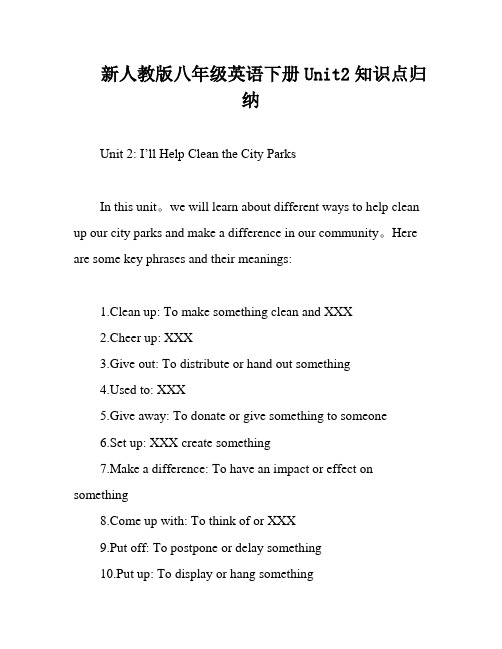
新人教版八年级英语下册Unit2知识点归纳Unit 2: I’ll Help Clean the City ParksIn this unit。
we will learn about different ways to help clean up our city parks and make a difference in our community。
Here are some key phrases and their meanings:1.Clean up: To make something clean and XXX2.Cheer up: XXX3.Give out: To distribute or hand out somethinged to: XXX5.Give away: To donate or give something to someone6.Set up: XXX create something7.Make a difference: To have an impact or effect on somethinge up with: To think of or XXX9.Put off: To postpone or delay something10.Put up: To display or hang somethingHere are some usage notes to keep in XXX:1.Need to do something: To require or be necessary to do something2.Make plans to do something: To create a plan or strategy for doing something3.Ask someone (not) to do something: To request or demand that someone (not) do somethinged to do something: To refer to a past XXX5.Decide to do something: To make a XXX do something6.Help someone (to) do something: To assist or aid someone in doing something7.Make a difference to: To have an impact or effect on something8.Make it possible for someone to do something: To enable or XXX do somethingNow。
人教版八年级下册英语unit2单词

人教版八年级下册英语unit2单词单词是八年级英语学习的重中之重。
小编整理了关于人教版八年级下册英语的单词,希望对大家有帮助!人教版八年级下册英语单词:unit2keep out 不让……进入play v.播放argue ['ɑ:ɡju:] v.争论;争吵wrong [rɔŋ] adj.错误的;有毛病的;不合适的What's wrong? 怎么了?style [stail] n.风格、款式、式样out of style 不时髦的,过时的could [kud, kəd] modal v. can的过去式What’s the matter ['mætə] 怎么了call sb. up 打电话给ticket ['tikit] n.票;入场券surprise [sə'praiz] v.使惊奇;使意外on the phone 用电话交谈;在通话pay for 付……款、付买……的钱part-time job 兼职工作okay ['əu'kei] adj.好的either ['aiðə] adj.任一的;(两方中的)每一方的bake [beik] v.烤;烘Teen Talk [ti:n] 青少年论坛(节目名称)tutor ['tju:tə] n.家庭教师original [ə'ridʒinəl] adj.新颖的the same as 与……同样的in style [stail] 时髦的;流行的haircut ['heə'kʌt] n.理发;发型except [ik'sept] prep.除;把--除外upset [ʌp'set] adj.心烦的,沮丧的fail [feil] v.失败get on 相处;进展didn't = did notcouldn't = could notreturn [ri'tə:n] v.归还;送回football ['futbɔ:l] n.足球until [ən'til,ʌn'til] 到--为止fit …into…找到时间(做某事)as……as possible ['pɔsəbl] 尽可能……pressure ['preʃə] n.压力complain [kəm'plein] v.抱怨;埋怨、发牢骚include [in'klu:d] v.包括;包含pushy ['puʃi] adj.固执己见的;一意孤行的push [puʃ] v.推;推动;督促sent [sent] v.派遣、打发、安排去all kinds of 各种各样的compare [kəm'pɛə] v.比较crazy ['kreizi] adj.疯狂的;狂热的themselves [ðəm'selvz] (反身代词)他(她,它)们自己adult ['ædʌlt] n.成年人on the one hand (在)一方面organized ['ɔ:ɡənaizd] adj.有组织的on the other hand (在)另一方面freedom ['fri:dəm] n.自由人教版八年级下册英语单词(一)comment ['kɔment] n.评论;意见album ['ælbəm] n.集子;唱片集;相片簿personal ['pə:sənəl] adj.私人的;个人的special ['speʃəl] adj.特别的;特殊的;专门的receive [ri'si:v] v.收到;接受gave [ɡeiv] v.give的过去式guy [ɡai] n.家伙;人spider ['spaidə] n.蜘蛛mouse [maus] n.(pl.mice)老鼠hamster ['hæmstə] n.仓鼠snake [sneik] n.蛇turtle ['tə:tl] n.海龟child [tʃaild] n.孩子;儿女pot-bellied [pɔt],'belid] 大腹便便的;大肚子的pig n.猪advantage [əd'vɑ:ntidʒ] n.有利条件;优点disadvantage ['disəd'vɑ:ntidʒ] n.不利条件;缺点popular ['pɔpjulə] adj.流行的perfect ['pə:fikt] adj.完美的,理想的rabbit ['ræbit] n.兔;野兔clean [kli:n] adj.清洁的;干净的company ['kʌmpəni] n.伙伴cost [kɔst] v.价值(若干);花(多少钱)asleep [ə'sli:p] adj.睡着的fall asleep 入睡choose [tʃu:z] v.选择present ['prezənt] n.礼物open v.打开gave [ɡeiv] v.give的过去式give away 赠送;分发bench [bentʃ] n.长凳;长椅rather than ['rɑ:ðə] 而不是Sweden ['swi:dn] 瑞典instead [in'sted] adv.代替;而不是the Olympics [əʊ'lɪmpɪks] 奥林匹克运动会enter ['entə,'entə(r)] v.参加;进入nearly ['niəli] adv.几乎sang [sæŋ] v.sing的过去式clearly ['klɪəlɪ] adv.清楚地;明显地stage [steidʒ] n.舞台native ['neitiv] adj.本地的;本国的native speaker 以某种语言为母语的人;说本族语的人winner ['wɪnə] n.胜利者modest ['mɔdist] adj.谦虚的,谦让的interested ['ɪntrɪstɪd] adj.感兴趣的encourage [in'kʌridʒ] v.鼓励spokesperson ['spəukspə:sn] n.发言人;代言人progress ['prəuɡres] n.进步;前进take an interested in 对……感兴趣hear of 听说make progress ['prəuɡres] 取得进步;取得进展besides 而且;除……之外make friends with 与……交友statement ['steitmənt] n.声明;陈述mention ['menʃən] v.提及;说起drive [draiv] v.开车;驾驶人教版八年级下册英语单词(二)Franklin ['fræŋklin] 富兰克林湖noon n.中午sandy ['sændi:,'sændi] adj.含沙的goodbye ['ɡʊd'baɪ] int.再见look through 浏览bookstore ['bʊk'stɔ:] n.书店cross [krɔs] v.穿过;横过;越过elevator ['eliveitə] n.电梯low [ləu] adj.低的slow [sləu] adj.慢的;缓慢的fan [fæn] n.迷;狂热迷note [nəut] n.短信;笔记come along [ə'lɔŋ] 出现;发生get along 相处baby n.婴儿;小孩at least [li:st] 至少traffic ['træfik] n.交通least [li:st] adj.little的最高级REVIEW OF UNITS 6-10review [ri'vju:] n.复习;回顾erhu 二胡(乐器名)Subtitle ['sʌb'taɪtl] n.(电影或电视上的)字幕web page 网页。
2020-2021学年人教新目标英语八年级下册词汇快速记忆学习法(第2组)

词汇快速记忆学习法第2组paper['peɪpə(r)]释义:n. 纸,文件,论文,报纸;v. 用纸糊,贴壁纸;adj.纸制的例句:He threw the paper onto the fire and it flew up the chimney.他把那张纸扔进火里,纸飘进了烟道。
例句:Remember to take some paper, a pen, etc.记住带些纸、笔等东西。
例句:He was a shrewd lawyer with a talent for uncovering paper trails of fraud.他是个精明强干的律师,能从一连串文件中找出诈骗的蛛丝马迹。
use[ju:s]释义:n. 利用,使用,用途;词汇快速记忆学习法v. 使用;vt. 使用,用例句:the efficient use of energy能源的有效利用例句:to optimize the use of resources充分利用资源例句:the optimum use of resources对资源的充分利用less[les]释义:a. 更少的,更小的;ad. 更少地,更小地例句:The trend at the moment is towards a more natural and less made - up look.现在流行的是外表上更注重少加装扮的自然美.词汇快速记忆学习法例句:The idiom delivers more information in return for less effort by users.这个习惯用法能让用户付出的努力更少,却得到了更多的信息.例句:We need to build better cars for less money.我们需要用较少的的钱制造出更好的汽车.fewer['fju:ə]释义:a. 少的;int. 较少数;a. 较少的例句:Better living conditions mean more live births and fewer stillbirths.生活条件改善就会有较多的活产,较少的死产.例句:We need fewer organizers and more doers.我们需要的是少些组织者,多些实干者。
Unit2单词详解人教版英语八年级下册
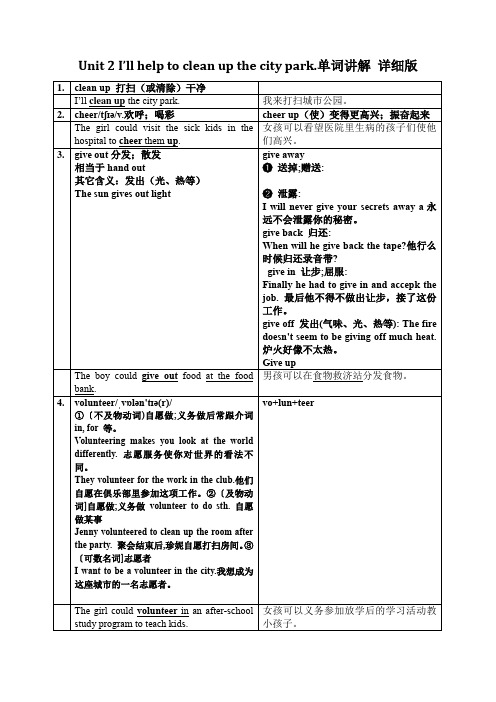
③[用单数]想法;看法:
i have a feeling that we can solve these little difficulties.我觉得我们能解
决这些小难题。
17.
satisfaction/ˌsætɪs'fækʃn/n.满足;满意
一般用作不可数名词。
to one's satisfaction让某人满意
➊签(名);签字:
Sign in when you come to the indoor climbing center.到达室内攀岩中心时要签到。
❷示意;以手势表示:
The teacher signed for / to me to enter.老师示意我进来。
sign up (for)报名参加(课程等);登记注册:
I will put up a notice about the meeting.我会贴一张会议通知。
vt&vi[通常不用于进行时]注意(到);察觉(到):
People were making fun of him but he didn't seem to notice.人们在取笑他,但他好像并没有注意到。
Take notice of...注意...留意... take no notice of别留意。
I shouted for help but they took no notice
②[C]布告(牌);通告;通知: a notice saying "Keep off the grass"一块写着“勿踏草坪”的公告牌
come in进来come on快点儿;加油
come true实现comeup走近;走上前来
八年级下册英语人教版第二单元单词
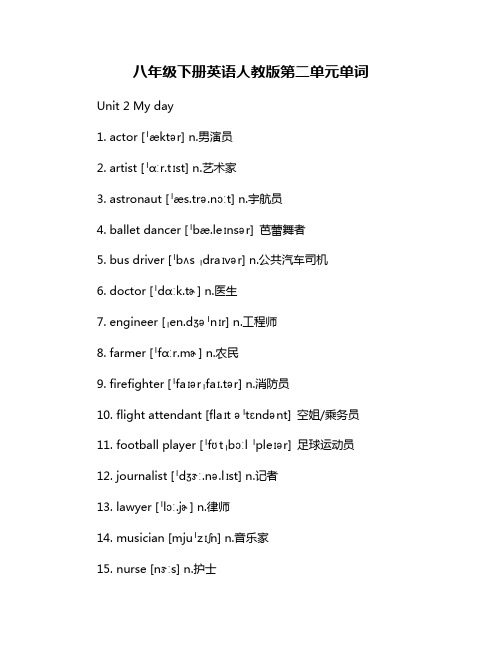
八年级下册英语人教版第二单元单词Unit 2 My day1. actor [ˈæktər] n.男演员2. artist [ˈɑːr.tɪst] n.艺术家3. astronaut [ˈæs.trə.nɔːt] n.宇航员4. ballet dancer [ˈbæ.leɪnsər] 芭蕾舞者5. bus driver [ˈbʌs ˌdraɪvər] n.公共汽车司机6. doctor [ˈdɑːk.tɚ] n.医生7. engineer [ˌen.dʒəˈnɪr] n.工程师8. farmer [ˈfɑːr.mɚ] n.农民9. firefighter [ˈfaɪərˌfaɪ.tər] n.消防员10. flight attendant [flaɪt əˈtɛndənt] 空姐/乘务员11. football player [ˈfʊtˌbɔːl ˈpleɪər] 足球运动员12. journalist [ˈdʒɝː.nə.lɪst] n.记者13. lawyer [ˈlɔː.jɚ] n.律师14. musician [mjuˈzɪʃn] n.音乐家15. nurse [nɝːs] n.护士16. painter [ˈpeɪntər] n.画家17. photographer [fəˈtɑː.grə.fər] n.摄影师18. police officer [pəˈlis ˈɔːfɪsər] n.警察19. singer [ˈsɪŋɚ] n.歌手20. soldier [ˈsoʊldʒər] n.士兵21. teacher [ˈtiː.tʃɚ] n.教师22. waiter [ˈweɪ.t̬ɚ] n.侍者23. writer [ˈraɪ.t̬ɚ] n.作家Throughout this unit, we have been introduced to a wide range of professions and occupations. From actors to astronauts, doctors to engineers, and teachers to writers, there are countless roles people take on in society. Each profession requires different skills, expertise, and responsibilities, all contributing to the functioning of our communities.One of the most admired professions is that of a doctor. Doctors play a vital role in society by caring for the health and well-being of individuals. They diagnose illnesses, provide treatments, and offer advice on how to maintain a healthy lifestyle. Without doctors, our healthcare system would not be able to function effectively.Another important profession is that of a teacher. Teachers are responsible for educating and nurturing the next generation. They impart knowledge, skills, and values to their students, helping them grow into productive members of society. Teachers play a crucial role in shaping the future of our world.Journalists are another group of professionals who play a significant role in society. They gather news, investigate stories, and report information to the public. Journalists keep society informed and hold those in power accountable. Their work is essential for maintaining transparency and promoting democracy.Musicians, painters, and photographers are artists who enrich our lives with their creativity. They inspire us, evoke emotions, and provide entertainment. Artists contribute to the cultural richness of society and help us appreciate the beauty in the world around us.In times of crisis, we rely on firefighters, police officers, and soldiers to keep us safe. These brave individuals put themselves in harm's way to protect others and maintain law and order. Their dedication and courage are commendable, and we are grateful for their service.Overall, each profession plays a unique and valuable role in society. Whether it's providing healthcare, education, news, art, or safety, every job is important in its own way. We should respect and appreciate the work that people do, recognizing the contributions they make to our communities.。
2021--2022学年人教新目标八年级英语下册Unit 1--2单元 单词速记

Unit 1matter /'mætə(r)/ n. 问题; 事情【台湾词中词】毯子经常出现问题。
[例]What' s the matter?怎么了? 出什么事了?mat[mæt]n.垫子,簇,小地毯,(体育运动用的)厚垫子垫子的问题sore /sɔ:(r)/ adj. 疼痛的; 酸痛的[例]I have a sore back.我后背痛。
【词汇倍增】我的core有点sorecore [kɔː(r)]n. 核心,(水果的)果心,(物体的)中心部分have a cold 感冒[例]I have a cold.我感冒了。
stomachache /'stʌməkeɪk/ n. 胃痛; 腹痛have a stomachache 胃痛[例]I have a stomachache.我胃痛。
【英国字母索源法】stomach(胃)+ache(痛)foot /fʊt/ n. 脚; 足【英国字母索源法】f代表“五官”[例]One of my feet is dirty.我的一只脚脏了。
neck /nek/ n. 颈; 脖子【英国字母索源法】n代表“细长”[例]The neck of the glass is dirty.杯颈脏了。
stomach /'stʌmək/ n. 胃; 腹部[例]what a stomach he has got !他可真是个大腹便便的人!【脑图单词速记】蛇s吐to马ma吃chthroat /θrəʊt/ n. 咽喉; 喉咙 p.1【英国字母索源法】thr代表“三”throat喉咙--通向三处,Third第三 thirteen十三 thirty三十。
[例]She has a very sore throat now.她现在嗓子疼的很厉害。
【词汇倍增】一只goat(山羊)穿件coat(衣服)上了boat(船)掉进moat(城壕)摔断throat (喉咙)fever /'fi:və/ n. 发烧[例] She has a fever.她发烧了。
人教版八年级下unit2 词汇知识详解(讲义)
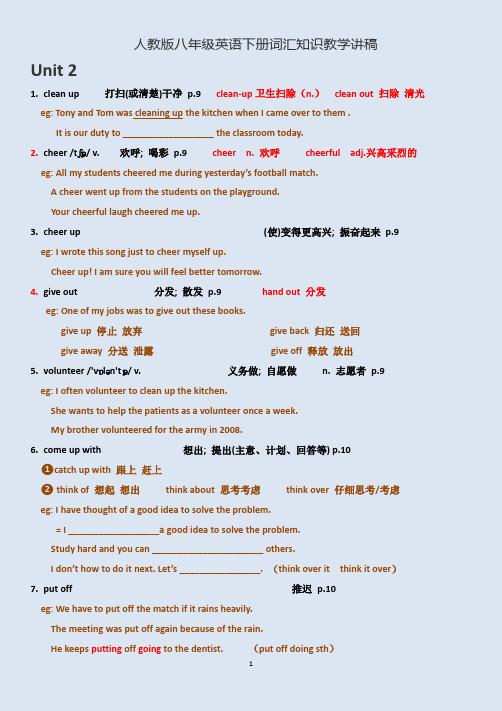
人教版八年级英语下册词汇知识教学讲稿Unit 21.clean up 打扫(或清楚)干净p.9 clean-up卫生扫除(n.)clean out 扫除清光eg: Tony and Tom was cleaning up the kitchen when I came over to them .It is our duty to __________________ the classroom today.2.cheer /tʃɪə/ v. 欢呼; 喝彩p.9 cheer n. 欢呼cheerful adj.兴高采烈的eg: All my students cheered me during yesterday’s football match.A cheer went up from the students on the playground.Your cheerful laugh cheered me up.3.cheer up (使)变得更高兴; 振奋起来p.9 eg: I wrote this song just to cheer myself up.Cheer up! I am sure you will feel better tomorrow.4.give out 分发; 散发p.9 hand out 分发eg: One of my jobs was to give out these books.give up 停止放弃give back 归还送回give away 分送泄露give off 释放放出5.volunteer /'vɒlən'tɪə/ v. 义务做; 自愿做n. 志愿者p.9eg: I often volunteer to clean up the kitchen.She wants to help the patien ts as a volunteer once a week.My brother volunteered for the army in 2008.e up with 想出; 提出(主意、计划、回答等) p.10❶catch up with 跟上赶上❷ think of 想起想出think about 思考考虑think over 仔细思考/考虑eg: I have thought of a good idea to solve the problem.= I __________________a good idea to solve the problem.Study hard and you can ______________________ others.I don’t how to do it next. Let’s ________________. (think over it think it over)7.put off 推迟p.10eg: We have to put off the match if it rains heavily.The meeting was put off again because of the rain.He keeps putting off going to the dentist. (put off doing sth)8.sign /saɪn/ n. 标志; 信号手势p.10 签名v.eg: This is an unusual sign.There is no sign that he will leave for Japan.If you can’t sign your name, make a cross instead.9.notice /'nəʊtɪs/ n. 通知; 通告; 注意v. 注意到; 意识到p.10eg: I have received the notice and I have to put off the date.A very good idea came to my notice when I was thinking it over.No one noticed that there was anything wrong with the machine.10.h and out 分发p.10eg: Could you please help me hand out these books?11.c all up 打电话给(某人); 征召p.10 eg: You should call up the police when you are in danger.When I was in Lanzhou, I called him up.Our teachers called on us to work hard. 动+介12.u sed to 曾经......; 过去...... p.10❶used to 过去常常做... +动词原形❷be used to doing sth 习惯于做某事❸be uesd to do sth 被用来做某事eg: My father used to smoke and drink too much.I am used to getting up early in the morning now.The medicine is used to fight against the corona virus.13.l onely /'ləʊnlɪ/ adj. 孤独的; 寂寞的p.10 alone adj. adv. 单独独自eg: He lives alone, but he never feels lonely.Don’t let the old men live in such a lonely village.14.c are for 照顾; 非常喜欢p.10 care about关心在乎take care of=look after eg: She cared for the sick baby all day.I don’t care about your opinion at all.15.s everal /'sevrəl/ pron. 几个; 数个; 一些p.11eg: Several hundred students are playing games on campus. (校园)16.s trong /strɒŋ/ adj. 强烈的; 强壮的p.11 weak弱的strengtheg: He is strong and powerful.17.f eeling /'fi:lɪŋ/ n. feelings 感觉; 感触情感p.11 eg: I was afraid of hurting their feelings.There is a feeling of warmth and trust here.18.s atisfaction /'sætɪs'fækʃən/ n. 满足; 满意p.11❶ satisfy v. 使满意dissatisfy v. 使不满意satisfying 令人满意的❷be satisfied with 对...感到满意eg: Playing the piano i s one of his greatest satisfactions.My parents are satisfied with my great progress.19.j oy /dʒɒɪ/ n. 高兴; 愉快p.11 joyful adj. 高兴的可喜的eg: Her child is a great joy for her.They jumped for joy when they heard the good news.20.o wner /'əʊnə/ n. 物主; 主人p.11 own v. 拥有占有eg: Who owns the dog?Every pet owner should know how to keep pets rightly.21.t ry out 参加......选拔; 试用p.11 eg: I want to try out for the football team.He always tries out some new ideas.try on 试穿try to do sth 努力去做... try doing sth 尝试做了... eg: He tried climbing the tall tree, and he succeeded.He tried to climb the tall tree and wanted to be the winner.22.j ourney /'dʒɜ:nɪ/ n. (尤指长途)旅行; 行程p.11 eg: The long journey made all of us tired.The journey to the West is a classic Chinese novel.23.raise /'reɪz/ v. 募集; 征集举起抬起p.12 rise 升起上升eg: They have raised a lot of money.Raise your hand in this way and say “ahh”.The sun rises in the east.The prices of masks rose surprisingly in February.24.alone /ə'ləʊn/ adv. 独自; 单独p.12eg: I need time to think alone.He lives alone with a cat called Garfield.25.r epair /rɪ'peə/ v. 修理; 修补p.13eg: He is repairing the radio for me.You have failed to repair the computer.26.f ix /fɪks/ v. 修理; 安装p.13 fix up 修补修理好eg: We are going to fix the broken machine.It took me a whole day to fix up the TV set.27.f ix up 修理; 装饰p.13eg: I fix up the broken bikes and give them away.28.g ive away 赠送; 捐赠p.13eg: Do you have any masks to give away?He will give away all his collections for nothing.29.t ake after (外貌或行为)像p.13 look likeeg: Does she take after her mother or her father?30.b roken /'brəʊkən/ adj. 破损的; 残缺的p.13 break v.eg: He came from a broken family.31.w heel /wi:l/ n. 车轮; 轮子p.13eg: The wheel turns freely now.They will remove the wheel and repair the broken car.32.l etter /'letə/ n. 信; 函p.14eg: Do you often receive any letters from your friends?33.M iss /mɪs/ n. 女士; 小姐p.14 miss v. 思念错过eg: He missed Miss Liu very much wanted to see her but he missed the train.34.s et up 建立; 设立p.14 eg: We need to set up a hospital at once.35.d isabled /dɪs'eɪbld/ adj. 丧失能力的; 有残疾的p.14 eg: These disabled children need special care now.It is our bounden(义不容辞的)duty to help the disabled.36.m ake a difference 影响; 有作用p.14 eg: We can make a difference to the world.It is never too late to make a difference to our environment.37.b l i nd /blaɪnd/ adj. 瞎的; 失明的p.14eg: He is blind in the right eye.It is wrong for me to be blind to your opinion all the time.38.d eaf /def/ adj. 聋的p.14eg: He is deaf of one ear.Don’t be deaf to my advice.39.i magine /ɪ'mædʒɪn/ v. 想象; 设想p.14 imaginary adj imagination n.eg: Can you imagine how I expect you to help me?As everyone could imagine, he didn’t pass the exam.40.difficulty /'dɪfɪkəltɪ/ n 困难; 难题p.14 difficult adj.eg: Do you have difficulty getting up early every morning?Don’t be worried. We can overcome any difficulty41.open /'əʊpən/ v. 开; 打开p.14eg: Open the door at once and keep it open.42.door /dɔ:/ n 门p.14eg: Who is knocking on the front door?43.carry /'kærɪ/ v. 拿; 提; 扛p.14eg: Could you please help carry the box?44.train /treɪn/ v. 训练; 培训p.14 trian n. 火车eg: My job is to train these nurses to work in hospital.We should train them to make decisions for themselves.45.e xcited adj. 激动的; 兴奋的p.14eg: I am excited about your progress.I can’t describe how excited I was when my mother came to see me.46.t raining /'treɪnɪŋ/ n. 训练; 培训p.14eg: The teacher training school was founded in 1998.47.k indness /'kaɪndnɪs/ n. 仁慈; 善良p.14eg: Thank you for your kindness.I think it would be a kindness to tell him the bad news.48.c lever /'klevə/ adj. 聪明的; 聪颖的p.14 cute smarteg: His brother is much cleverer than him.49.u nderstand /'ʌndə'stænd/ v. (understood) 理解; 领会p.14eg: We don’t understand what you say.50.c hange v. & n. 变化; 改变p.14 eg: Great changes have taken place in our hometown Zhangye these years.51.i nterest /'ɪntrɪst/ n. 兴趣; 关注; v. 使感兴趣; 使关注p.16be interested in 对...感兴趣become interested ineg: We should encourage students in their interests and hobbies.What you said can’t interest me at all.Please talk about something that interests us.52.s ir /sɜ:/ n. 先生s ir Mr Wang53.m adam /'mædəm/ n. 夫人; 女士madam Mrs Wang Miss Wang Ms Wang。
人教版八年级英语(下)unit2词汇讲解(共39张PPT)

volunteer
Volunteer v.志愿做,义务做 n.志愿者 放学后,珍妮自愿打扫教室。 Jenny volunteer to clean up the classroom after school.
我想做一名环保志愿者。 I want to be an environmental volunteer.
notice (注意)of what they say. Take _______ notices After school, let’s hand out the _______ to
the students.
lonely孤独的 vs. alone独自地
lonely . A lot of old people feel_______ 1. 没有了朋友,他感到很孤独。 He felt very lonely without his friends. 2. 他喜欢独自生活。 He likes living alone.
call up 打电话给某人
I called up my father and told him the news. call up sb.给某人打电话 call on + sb. 拜访 call at + sw.拜访 I called on the doctor yesterday. 我昨天拜访了医生。 I called at the doctor’s yesterday. 我昨天去了医务室。
cheer up 变得更高兴,振作起来
He cheered up at once when I agreed to help him. 当我同意帮助他时,他马上高兴起来。
为了让她高兴起来,他带她去了电影院。 He took her to the cinema to cheer her up.
【初中单词记忆】人教版八年级下册单词 2

骗子
↑
tail /teil/ n.尾巴
提取转化:tai——太太;l——木棍 联结回归:太太拿着木棍打狐狸的尾巴。
二、找近似拼音:
Japanese /ˌdʒæpəˈni:z/ n.&adj.日本人;日语;日本的
提取转化:ja——家;pan——盘子;e——鹅;se——色 联结回归:日本人家里的盘子是鹅黄色的。
第三步:找编码(找字母编码)
把单个或多个字母通过象形等方法转变为常用的编码。
yard /jɑ:d/ n.院子
提取转化:y——撑衣杆;ar——爱人;d——笛子 联结回归:院子里的撑衣杆被爱人拿去做成了笛子。
allow /əˈlaʊ/ v.允许;准许
提取转化:a——苹果;llo——110;w——裙子 联结回归:苹果打110带走那只裙子是允许的。
shocked /ʃɔkt/ adj.震惊的;震撼的
提取转化:s——蛇;ho——猴;cke——刺客;d——笛子 联结回归:蛇和猴都因为刺客吹笛子而震惊了。
小结:
s像蛇、f像拐杖、t像伞、p像红旗、 m联想到麦当劳、k联想到肯德基,等等, 这些就是对字母进行编码,把抽象的字 母转化为熟悉的图像,这样,图像记忆 法就能很好地运用出来了。因此,“找 编码”这个步骤训练的是我们把字母灵 活地转变成图像的能力。
经过我们深入系统的研究,单词记忆的方法, 可以归纳为最简单的四个步骤:
人教版英语八年级下册U2单词及重点归纳
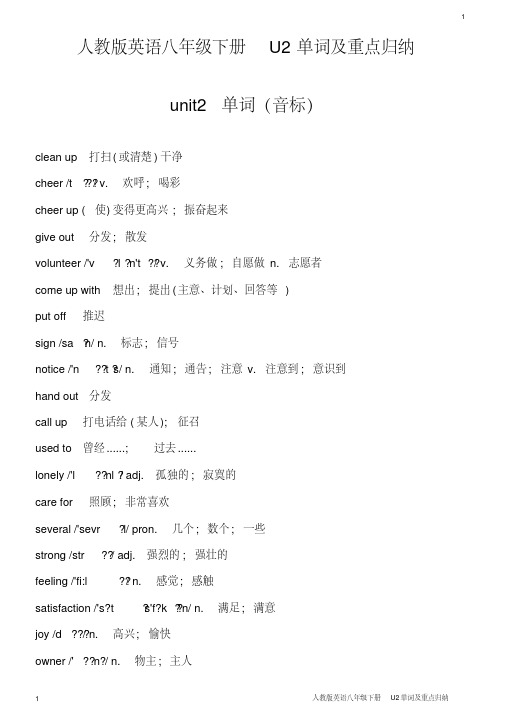
1人教版英语八年级下册U2单词及重点归纳unit2单词(音标)clean up 打扫(或清楚)干净cheer /t???/ v. 欢呼; 喝彩cheer up (使)变得更高兴; 振奋起来give out 分发; 散发volunteer /'v?l?n't??/ v. 义务做; 自愿做n. 志愿者come up with 想出; 提出(主意、计划、回答等)put off 推迟sign /sa?n/ n. 标志; 信号notice /'n??t?s/ n. 通知; 通告; 注意v. 注意到; 意识到hand out 分发call up 打电话给(某人); 征召used to 曾经......; 过去......lonely /'l??nl?/ adj.孤独的; 寂寞的care for 照顾; 非常喜欢several /'sevr?l/ pron.几个; 数个; 一些strong /str??/ adj.强烈的; 强壮的feeling /'fi:l??/ n. 感觉; 感触satisfaction /'s?t?s'f?k??n/ n. 满足; 满意joy /d/ n. 高兴; 愉快owner /'??n?/ n. 物主; 主人2try out 参加......选拔; 试用journey /'d??:n?/ n. (尤指长途)旅行; 行程raise /'re?z/ v. 募集; 征集alone /?'l??n/ adv.独自; 单独repair /r?'pe?/ v. 修理; 修补fix /f?ks/ v. 修理; 安装fix up 修理; 装饰give away 赠送; 捐赠take after (外貌或行为)像broken /'br??k?n/ adj.破损的; 残缺的wheel /wi:l/ n. 车轮; 轮子letter /'let?/ n. 信; 函Miss /m?s/ n. 女士; 小姐set up 建立; 设立disabled /d?s'e?bld/ adj. 丧失能力的; 有残疾的make a difference 影响; 有作用blind /bla?nd/ adj. 瞎的; 失明的deaf /def/ adj. 聋的imagine /?'m?d??n/ v. 想象; 设想difficulty /'d?f?k?lt?/ n. 困难; 难题open /'??p?n/ v. 开; 打开door /d?:/ n. 门carry /'k?r?/ v. 拿; 提; 扛train /tre?n/ v. 训练; 培训excited adj. 激动的; 兴奋的3 training /'tre?n??/ n. 训练; 培训kindness /'ka?ndn?s/ n. 仁慈; 善良clever /'klev?/ adj. 聪明的; 聪颖的understand /'?nd?'st?nd/ v. (und erstood) 理解; 领会change v. & n. 变化; 改变interest /'?ntr?st/ n. 兴趣; 关注;v.使感兴趣; 使关注sir /s?:/ n. 先生(用于正式信函中对不知名的男性收信人的称呼时, 写为Sir) madam /'m?d?m/ n. 夫人; 女士(用于正式信函中对不知名的女性收信人的称呼时,写为Madam)Mario /'mereo/ 马里奥(男名)Jimmy /'d??m?/ 吉米(男名)【重点短语】1.Clean-Up Day 清洁日2. an old people’s home 养老院3. help out with sth. 帮助解决困难4. used to 过去常常......5. care for 关心;照顾6. the look of joy 快乐的表情7. at the age of 在......岁时8.clean up 打扫(或清除)干净9. cheer up (使)变得更高兴;振奋10. give out 分发;散发11. come up with 想出;提出412. make a plan 制订计划13. make some notices 做些公告牌14. try out 试用;试行15. work for 为…工作;为…. 效力16. put up 建造;举起;张贴17. hand out 分发;散发;发给18. call up 打电话;召集19. put off 推迟;延迟20. for example 比如;例如21. raise money 筹钱;募捐22. take after 与......相像;像23. give away 赠送;捐赠24. fix up 修理;修补;解决25. be similar to 与……相似26. set up 建立;设立27. disabled people 残疾人28. make a difference 影响;有作用29. be able to 能够30. after-school reading program 课外阅读项目【重点句型】1. The boy could give out food at the food bank. 这个男孩可以在食品救济站分发食物。
八年级英语下册Unit 2重点知识人教版
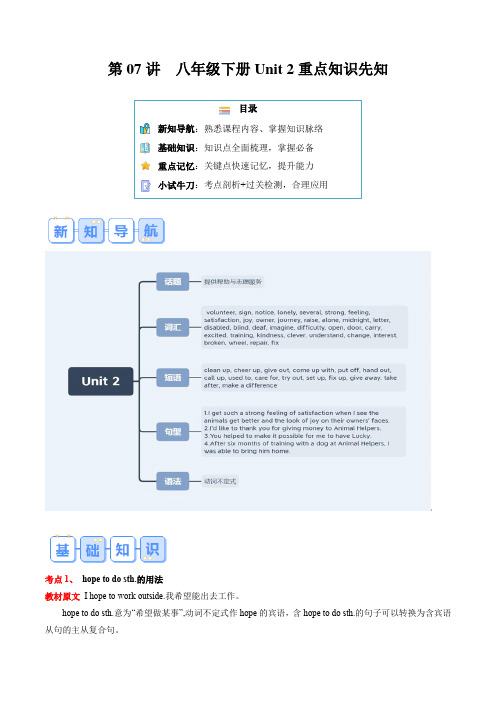
第07讲八年级下册Unit 2重点知识先知目录新知导航:熟悉课程内容、掌握知识脉络基础知识:知识点全面梳理,掌握必备重点记忆:关键点快速记忆,提升能力小试牛刀:考点剖析+过关检测,合理应用考点1、hope to do sth.的用法教材原文I hope to work outside.我希望能出去工作。
hope to do sth.意为“希望做某事”,动词不定式作hope的宾语,含hope to do sth.的句子可以转换为含宾语从句的主从复合句。
I hope to pass the exam.=I hope that I can pass the exam.我希望我能够通过考试。
拓展“动词+to do sth.”结构的短语考点2、clean up的用法··········教材原文You could help to clean up the city parks.你可以帮助打扫城市公园。
本句中的clean up是固定搭配,意为“打扫(或清除)干净”。
它的宾语有两种情况:party was over.聚会结束之后,他们开始打扫厨房。
考点3、cheer up的用法···········教材原文The girl could visit the sick kids in the hospital to cheer them up.那个女孩可以去看望医院里生病的孩子,使他们振作起来。
cheer up 意为“(使)变得更高兴;振奋起来”.cheer up的宾语有两种情况:sick children up.让我们去儿童医院使那些生病的孩子们振作起来吧。
The good news cheered him up.这个好消息使他振作了起来。
人教版(Go forit)八年级下册英语单词拆分速记法

人教版(Go forit)八年级下册单词拆分robot['rɔbət]n. 机器人联想方式:ro肉;bot膊头记忆方法:这个机器人长有肉膊头paper['peipə]n. 纸;报纸;论文联想方式:pa爬;per-每个记忆方法:爬行的每个小朋友手里都拿着一张纸fewer['fju:ə]a. 较少的(few的比较级)联想方式:few(很少);er(比较级)记忆方法:few的比较级形式。
pollution[pə:'lju:ʃən]n. 污染联想方式:po破;ll筷子;u油;tion渗记忆方法:破旧的筷子上面有油渗漏,这也是一种污染。
tree[tri:]n. 树联想方式:tre(天热);e(鹅)记忆方法:天热时鹅躲在树下乘凉。
astronaut['æstrənɔ:t]n. 宇航员联想方式:a(一只);stron–strong(强壮);aut~ant(蚂蚁)记忆方法:一只强壮的蚂蚁当了宇航员。
rocket['rɔkit]n. 火箭联想方式:ro弱;cke乘客;t 偷记忆方法:虚弱的乘客想偷火箭space[speis]n. 空间,太空联想方式:s(蛇);pa(趴);ce(车)记忆方法:蛇趴在车上游太空。
fly[flai]v. 飞n. 飞行;苍蝇联想方式:fly-福利院记忆方法:苍蝇在福利院上空飞来飞去moon[mu:n]n. 月亮;月球;月状物联想方式:moon-mood记忆方法:月亮对科学家牛顿闹情绪。
fall[fɔ:l]v. 掉下;降落;倒下n. (美)秋季;瀑布联想方式:f-斧头all-全部记忆方法:秋天斧头全部从树上落下来.fell[fel]v. 掉下;降落;倒(fall的过去式)联想方式:fell-feel记忆方法:倒下后感到了一阵阵痛楚。
alone[ə'ləun]a. 单独的;孤独的adv. 单独地;独自地联想方式:al~all(都是);one(一个)记忆方法:所有的事情都是一个人做,当然孤独。
人教版八年级下册英语Unit2 重点单词讲解
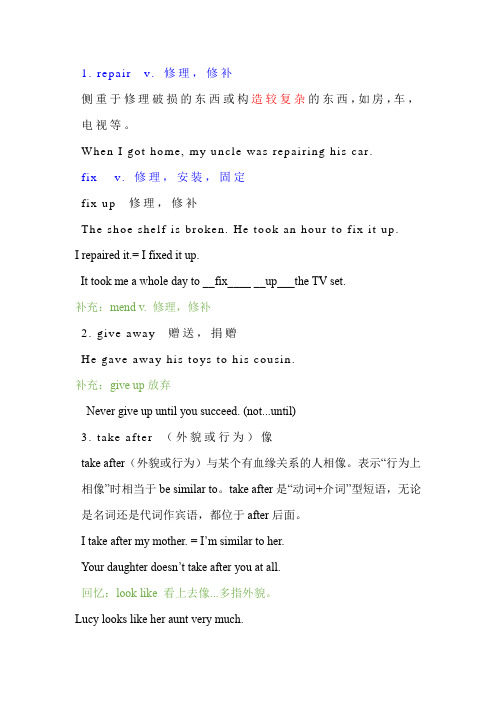
1.repair v. 修理,修补侧重于修理破损的东西或构造较复杂的东西,如房,车,电视等。
When I got home, my uncle was repairing his car.fix v. 修理,安装,固定fix up 修理,修补The shoe shelf is broken. He took an hour to fix it up.I repaired it.= I fixed it up.It took me a whole day to __fix____ __up___the TV set.补充:mend v. 修理,修补2.give away 赠送,捐赠He gave away his toys to his cousin.补充:give up放弃Never give up until you succeed. (not...until)3.take after (外貌或行为)像take after(外貌或行为)与某个有血缘关系的人相像。
表示“行为上相像”时相当于be similar to。
take after是“动词+介词”型短语,无论是名词还是代词作宾语,都位于after后面。
I take after my mother. = I’m similar to her.Your daughter doesn’t take after you at all.回忆:look like 看上去像...多指外貌。
Lucy looks like her aunt very much.4.broken adj. 破损的,残缺的Jimmy fixes up broken bicycle parts, like wheels.break-broke-brokenShe dropped the plate and it broke into pieces.5.wheel n. & v. 轮子,车轮;旋转联想:wheelchair6.letter n. 信件,字母write a letter to sb. 给某人写信=write sb. a letter=write to sb.回忆receive a letter from sb.=hear from sb.accept接受refuse7.set up 建立,设立(常与表示学校,医院,团体等机构或者组织的名词连用。
人教版八年级下册英语单词 (2)

人教版八年级下册英语单词Unit 1:At the Fun FairNouns1.fair - a gathering of stalls and amusements for public entertainment2.carousel - a revolving machine with horses, etc., for riding on, especially one at a fair3.ferris wheel - a giant wheel with seats for people to ride on and enjoya view4.roller coaster - a small railway, usually in an amusement park, wherea carriage moves quickly up and down different slopes and around bends5.bumper cars - small electric cars that can be driven into each other gently as a game at a fair6.stall - a small shop or the place where something is sold at a fair, market, etc.Verbs1.enjoy - to take pleasure or satisfaction in something2.experience - to encounter, undergo or meet with, especially unexpected difficulties or circumstances3.ride - to sit on and control the movement of something that moves across the ground, especially as a form of transport4.scream - to cry or say something very loudly because you are frightened or have strong feelings5.spin - to (cause someone or something to) turn around quickly6.steer - to control the direction of a vehicleAdjectives1.exciting - causing great enthusiasm and eagerness2.thrilling - causing a sudden feeling of excitement and pleasure3.noisy - making a lot of noise4.scary - causing fear5.dizzy - having a feeling of spinning and being about to fall Adverbs1.fast - quickly2.loudly - making a lot of noiseUnit 2: How do you study for a test?Nouns1.test - a set of questions or exercises designed to measure your knowledge or skill in a particular subject2.study - the effort to acquire knowledge by reading, memorizing facts, attending school, etc.3.method - a particular way of doing something4.memory - the ability to remember information, experiences, etc.5.schedule - a plan of what someone is going to do and when they are going to do itVerbs1.study - to spend time learning about a subject by reading, attending school, etc.2.review - to study or look at something again3.memorize - to learn something thoroughly so that you remember it exactly4.concentrate - to give all your attention to something and not think about anything else5.revise - to change or improve something6.plan - to decide what you are going to do and how you are going to do itAdjectives1.effective - successful or achieving the results that you wantanized - done or arranged in a planned wayAdverbs1.carefully - in a way that shows you are thinking about what you are doing and being careful not to do anything wrong2.quickly - in a fast or rapid mannerUnit 3: Travelling around ChinaNouns1.journey - the act of traveling from one place to another2.attraction - something that makes people want to go to a place or do a particular thing3.snack - a small amount of food that is eaten between meals or instead of a meal4.sight - something interesting or beautiful to see5.experience - something that happens to you or something you do or feel6.adventure - an unusual, exciting, and possibly dangerous activity, such as a trip or experience7.tour - a journey during which you visit several different places8.guide - a person who shows the way to others, especially someone who shows tourists around placesVerbs1.travel - to go from one place to another, usually over a long distance2.visit - to go to a place in order to look at it or spend time there, etc.3.taste - to have a particular flavor4.explore - to search and discover (about a place or area)5.hike - a long walk, especially in the countryside or wildernessAdjectives1.amazing - causing great surprise or wonder2.delicious - having a very pleasant tasteUnit 4: CareersNouns1.career - the job or series of jobs that you do during your working life2.job - the regular work that a person does to earn money3.doctor - a person who is trained to give medical treatment4.engineer - a person who designs or builds engines, machines, etc.5.architect - a person who designs buildings6.waiter/waitress - a person who serves food to people in a restaurant7.chef - a skilled and trained cook who works in a restaurantVerbs1.work - to do a job as part of your regular activities2.design - to make a drawing, pattern, or plan of something3.serve - to give food or drink or provide a service to someone4.cook - to prepare food by heating it5.earn - to receive money as payment for work that you doAdjectives1.successful - achieving or having achieved success2.skilled - having the ability, knowledge, or experience to do something wellAdverbs1.hard - with a great deal of effort or endurance2.well - in a successful or effective mannerThis is just a sample vocabulary list for the English textbook。
人教版八年级下册英语unit2笔记

人教版八年级下册英语unit2笔记English:In unit 2 of the eighth grade English textbook of People's Education Press, the main learning content is about wildlife protection. The unit includes several sections, such as "Reading", "Vocabulary", "Grammar" and "Integrated Skills". In the "Reading" section, students will learn about different endangered animals and the reasons behind their declining population. The "Vocabulary" section focuses on learning new words and phrases related to wildlife and conservation. The "Grammar" section introduces the use of modal verbs to express possibility and necessity. In the "Integrated Skills" section, students are required to apply their reading, vocabulary, and grammar knowledge to complete tasks related to wildlife protection. Throughout the unit, students will develop a better understanding of the importance of wildlife protection and learn how to express opinions and suggestions related to this topic.中文翻译:在人教版八年级下册英语教材的第二单元中,主要学习内容是关于野生动物保护的知识。
- 1、下载文档前请自行甄别文档内容的完整性,平台不提供额外的编辑、内容补充、找答案等附加服务。
- 2、"仅部分预览"的文档,不可在线预览部分如存在完整性等问题,可反馈申请退款(可完整预览的文档不适用该条件!)。
- 3、如文档侵犯您的权益,请联系客服反馈,我们会尽快为您处理(人工客服工作时间:9:00-18:30)。
carry ['kæri] v.拿;提;扛 分析:car-车、ry-燃油 记忆方法:到车上拿一桶燃油。
train [treɪn] v.训练;培训 分析:tr-太热、a-苹果、in-在……里面
记忆方法:天气太热,大家吃着苹果在课室里面培训。
excited [ɪk'saɪtɪd] adj.激动的;兴奋的 分析:e-鹅、x-剪刀、cit-磁铁、ed-耳朵 记忆方法:兴奋的鹅用剪刀夹着磁铁塞进耳朵。
broken ['brəʊkən] adj.破损的;残缺的 分析:br-病人、o-乒乓球、ken-啃 记忆方法:病人把破损的乒乓球啃了。
wheel [wiːl] n.车轮;车子 分析:w-乌鸦、heel-脚后跟 记忆方法:乌鸦的脚后跟装了车轮。
letter ['letə(r)] n.信;函 分析:le-乐、tt-两把雨伞、er-儿 记忆方法:快乐地撑着两把雨伞的儿子在读信。
raise [reɪz] v. 募集;征集 分析:r-草、ai-爱、se-烧鹅 记忆方法:小草为了吃到心爱的烧鹅进行资金募集。
midnight [ˈmɪdnaɪt] n.午夜;子夜 分析:mi-米、d-弟弟、night-夜 记忆方法:午夜起床做米饭是弟弟每夜的习惯。
alone [ə'ləʊn] adv.独自;单独 分析:al-阿狸、one-一 记忆方法:阿狸是独自一个人(出去的)。
difficulty ['dɪfɪkəlti] n.困难;难题 分析:di-弟、ff-发疯、i-我、cu-醋、lty-两桶油 记忆方法:弟弟遇到困难就发疯,他把我的醋倒到 两桶油里了。
open ['əʊpən] v.开;打开 分析:o-乒乓球、pen-笔 记忆方法:打开乒乓球,发现里面有笔。
door [dɔː(r)] n.门 分析:d-弟弟、oo-望远镜、r-小草 记忆方法:弟弟在门缝用望远镜看小草。
training ['treɪnɪŋ] v.训练;培训 分析:tr-太热、a-苹果、in-在……里面、ing-鹰
记忆方法:天气太热,大家吃着苹果在课室里面训练老鹰。
kindness [ˈkaɪndnəs] n.仁慈;善良 分析:kind-好心的、ne-哪吒、ss-两条蛇 记忆方法:好心的哪吒放走了善良的两条蛇。
人民教育出版社
八年级下册--Unit 2
clean up 打扫(或清除)干净
cheer [tʃɪə],[tʃɪr] v.欢呼;喝彩 分析:che-车、er-人 记忆方法:车上的人都在欢呼。
cheer up (使)变得更高兴;振奋起来
give out 分发;散发
volunteer [,vɒlən'tɪə],[ˌvɑ:lənˈtɪr] v.义务做;自愿做; n. 志愿者 分析:v-五、o-鸡蛋、lun-轮、te-特、er-儿 记忆方法:志愿者拿五颗鸡蛋轮流发给特工的儿子。
Miss [mɪs] n.女士;小姐 分析:miss-思念 记忆方法:思念女士。
set up 建起;设立
disabled [dɪs'eɪbld] adj 丧失能力的;有残疾的 分析:di-弟、sa-洒、bl-玻璃、ed-耳朵
记忆方法:有残疾的弟弟被洒玻璃上的水弄湿了耳朵。
make a difference 影响;有作用
strong [strɒŋ],[strɔ:ŋ] adj.强烈的;强壮的 分析:str-石头人、on-在上面、g-鸽子 记忆方法:石头人头上有只强壮的鸽子。
feeling ['fiːlɪŋ] n.感觉;感触 分析:fee-费用、ling-零 记忆方法:费用是零元,感觉很好。
sactisfaction [ˌsætɪsˈfækʃn] n.满足;满意 分析:sa-洒、ct-窗台、is-是、fa-罚、c-月亮、tion-神
blind [blaɪnd] adj. 瞎的;失明的 分析:bli-玻璃、nd-脑袋 记忆方法:这个失明的人被玻璃撞到了脑袋。
deaf [def] adj.聋的 分析:de-德、a-苹果、f-父 记忆方法:德国人买苹果看望聋的父亲。
imagine [ɪ'mædʒɪn] v. 想象;设想 分析:i-蜡烛、m-汉堡包、ag-阿哥、ne-哪吒 记忆方法:用蜡烛烤汉堡包时,阿哥盯着蜡烛想象 哪吒藏在包中。
come up with 想出;提出(主意、计划、回答等)
put off 推迟
sign [saɪn] n.标志;信号
分析:si-四、gn-公牛 记忆方法:四头公牛都有标志。
notice ['nəʊtɪs] n.通知;通告; v.注意;注意到;意识到 分析:not-没有、ice-冰
记忆方法:他没有注意到冰块。
repair [rɪ'peə], [rɪˈper] v.修理;修补 分析:re-热、pair-一副 记忆方法:大热天里,他在修理一副眼镜。
fix [fɪks] v.修理;安装 分析:fi-鱼、x-剪刀 记忆方法:卡片鱼被剪刀修理了。
fix up 修理;装饰
give away 赠送;捐赠
take after (外貌或行为)像给(某人);征召
used to 曾经……;过去……
lonely ['ləʊnli] adj. 孤独的;寂寞的 分析:l-金箍棒、one-一、ly-旅游 记忆方法:孤独的金箍棒一个人去旅游。
care for 照顾,非常喜欢
several ['sevrəl] pron.几个;数个;一些 分析:sever-分开、al-阿狸 记忆方法:分开几个任务给阿狸。
记忆方法:把水洒在窗台,是罚月神劳作的最满意处置。
joy [dʒɔɪ] n.高兴;愉快 分析:j-鸡、oy-偶遇 记忆方法:和鸡偶遇,我很高兴。
owner ['əʊnə(r)] n.物主;主人 分析:own-我的、er-儿子 记忆方法:我的儿子是主人。
try out 参加……选拔;试用
journey ['dʒɜː(r)ni] n.(尤指长途)旅行;行程 分析:j-鸡、our-我们的、n-门、ey-鳄鱼 记忆方法:鸡在旅行中被我们家门前的鳄鱼吓到了。
